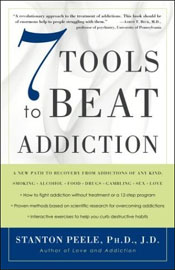 Book Review: Book Review:
7 Tools to Beat Addiction
By Stanton Peele, Ph.D., J.D. (Three Rivers
Press)
Reviewed by Chuck Armsbury, Razor Wire
Senior Editor
Stanton
Peele has been investigating, thinking, and writing about addiction
since 1969. His first bombshell book, Love and Addiction,
appeared in 1975. Its experiential and environmental approach
to addiction revolutionized thinking on the subject by indicating
that addiction is not limited to narcotics, or to drugs at all,
and that addiction is a pattern of behavior and experience which
is best understood by examining an individual's relationship
with his/her world.
7 Tools to Beat Addiction presents a refinement of Peele's lengthy and rich
experience in professional counseling work. This book takes a
distinctly nonmedical approach. It views addiction as a general
pattern of behavior that nearly everyone experiences in varying
degrees at one time or another.
Viewed in this context, addiction is not
unusual, although it can grow to overwhelming and life-defeating
dimensions. It is not essentially a medical problem, but a problem
of life. It is frequently encountered and very often overcome
in people's lives - the failure to overcome addictions is the
exception.
"Addiction is a way of coping with
life, of artificially attaining feelings and rewards people feel
they cannot achieve in any other way. As such, it is no more
a treatable medical problem than unemployment, lack of coping-skills,
or degraded communities and despairing lives.
The only remedy for addiction is for more
people to have the resources, values and environments necessary
for living productive lives. More treatment will not win our
badly misguided war on drugs. It will only distract our attention
from the real issues in addiction."
Peele's approach puts him at odds with
the American medical model of alcohol/drug abuse as a disease
- one that is gaining acceptance worldwide. Everything about
the disease approach - separating people and their substance
use from their ongoing lives, not recognizing that addiction
fades in and out with life conditions, viewing it as biogenetic
in origin -- is wrong, which Stanton strives to show throughout
this book and website.
His experiential, environmental approach
leads to a range of radical ideas for approaching seemingly insoluble
social problems concerning drugs, alcohol, and behavior. For
example:
A science of addiction geared towards brain
mechanisms, irrespective of life problems and experiences, is
barking up the wrong tree and is doomed to fail;
Self-cure is standard and occurs as people
come to grips with the problems, people, and patterns in their
lives;
As they do so, formerly problem users frequently
learn to use the substance moderately, or at least with fewer
problems;
Treatment succeeds by helping people navigate
their existence rather than by teaching them that they have an
inbred, life-long malady;
Most drinking and other substance use are
not pathological;
How children learn to view substances largely
determines whether they get stuck in drinking/drug use as a life-long
destructive habit;
A completely negative educational approach
to alcohol, as well as drugs, increases the likelihood children
will encounter substance use problems;
The notion that substance use is a disease
is simply the wrong way to prevent problems and to treat problems
when these appear;
Many activities which are correctly viewed
as addictions - like compulsive shopping, gambling, sex - have
incorrectly come to be treated as diseases;
One wrongheaded result of the whole disease
conception of addiction is that society now often excuses people
for criminal behaviors that are labeled as addictions or diseases
(e.g., PMS, post-traumatic shock, post-partum depression in addition
to alcoholism);
While it is correct instead to firmly punish
drug- and alcohol-related misbehavior, the punishment of simple
drug use - so-called "zero-tolerance" - is irrational
and has been proven to be an expensive failure;
Non-moralistic policies, education, and
treatment that recognizes that people may sometimes use drugs
or alcohol, but treatment that also engages people in productive
activity and assists people to overcome difficulties in their
lives, will succeed better - and certainly disrupt society and
the lives of users less - than our current policies and treatments.
Source: www.peele.net, selected and edited for emphasis
and space here
|





